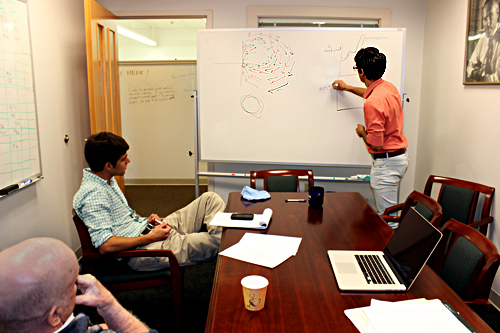Teamwork: In the Classroom vs. the Workplace
In my previous post, I described the different approaches to problem solving in the workplace as compared to the academic classroom. Today I want to emphasize another important difference between the classroom and the workplace: the role of teamwork.
In his book “Engaged Learning in the Academy”, David Moore of New York University postulates that the academic setting requires different kinds of learning as compared to the office environment. In the workplace, thinking is distributed across members of a team, whereas in school the cognitive work often has to be performed by an individual. Moore calls it “cognitive teamwork.”
The argument goes like this: In academia, teachers and students study a theory, and then test a hypothesis against evidence in pursuit of a conclusion that is universal, abstract, and decontextualized. As students master the scientific method, they are asked to produce an outcome (a paper, a research report) on an individual basis in order to receive a grade for the course. Even though group projects in academia are more in fashion today, there still needs to be an individual component on which to base the student’s assessment.
In the workplace, people encounter and handle concrete, situated problems. While searching for a solution, they take context into account, and create the knowledge that is particular and contingent on a specific situation. Employees are usually required to work in teams, both formal and informal, working collaboratively on a project. So both the cognition itself and team building are different in the workplace than the classroom.
At AIER, as we work with our interns and summer fellows, we aim to complement the theoretical base that students bring with them by engaging them in “situated” learning. We pair students with AIER researchers, and allow their creativity to flourish by asking them to contribute meaningfully to the projects. By working on projects that tackle concrete issues, students develop the cognitive teamwork skills that Moore is talking about.
In my view, however, the most important outcome of AIER’s engagement with students is how they develop the ability and confidence to use this skill of cognitive teamwork in their future careers.
Picture: From L to R: Ken Driessel, Ethan Krohn, Rustin Partow at AIER.
Click here to sign up for the Daily Economy weekly digest!









